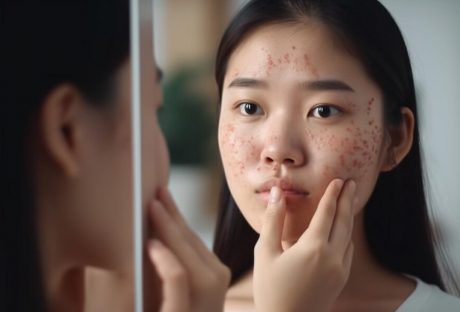Tag: diets high

Role Of Diet, Hormones & Skin Care On Acne
Acne, a prevalent skin condition affecting people of all ages, often becomes a source of frustration and self-consciousness. While acne products are readily available, comprehending the multifaceted factors contributing to acne is crucial. In this comprehensive exploration, we will delve into the role of diet, hormones, and skin care in managing acne. You can adopt a holistic approach to acne management by understanding how these aspects intertwine. The Impact of Diet on Acne Dietary Choices and Skin Health: Your diet is pivotal in determining your skin's health. Certain foods can significantly influence acne development. Food rich in fruits, vegetables, whole grains, and lean proteins gives essential nutrients supporting skin health. Antioxidants in colorful fruits and vegetables help combat free radicals that can exacerbate skin conditions. Lean proteins contain amino acids necessary for collagen production and skin repair. On the contrary, diets high in sugary foods, dairy products, and processed foods may exacerbate acne in some individuals. Excessive sugar intake can lead to increased insulin levels, which, in turn, stimulate the production of skin oils and contribute to clogged pores. The Glycemic Index Connection: Foods with a high glycemic index can lead to acne flare-ups. Consuming certain foods can cause an increase in blood sugar, causing the release of insulin. Insulin stimulates the production of androgens, leading to increased oil production in the skin and higher chances of clogged pores and acne. Foods with a low glycemic index, like whole grains, legumes, and non-starchy vegetables, can aid in stabilizing blood sugar levels and reduce the risk of acne breakouts. Hormones and Acne Hormonal Fluctuations: Hormonal changes during puberty, menstruation, pregnancy, and menopause undoubtedly trigger or worsen acne. Increased androgen production increases oil production, making the skin susceptible to clogged pores and acne breakouts. This hormonal influence is why acne is often associated with adolescence and can affect both teenagers and adults. Polycystic Ovary Syndrome (PCOS): It is a hormonal disorder that affects many women. It often leads to elevated androgen levels, contributing to acne and other skin issues. Managing PCOS through lifestyle changes and medications can help control acne symptoms. A healthcare provider can offer guidance and treatment options tailored to individual needs. Skincare Regimen for Acne Management Importance of Proper Cleansing: A consistent skincare routine is essential for effective acne management. Proper cleansing helps remove dirt, oil, and makeup, preventing pore blockages. However, avoiding harsh scrubbing or overly abrasive products is crucial, as these can irritate the skin and exacerbate acne. Choosing Acne Products: When selecting acne products, it's essential to consider your skin type and the severity of your acne. Look for acne products with active ingredients like salicylic acid, alpha hydroxy acids( AHA), and benzoyl peroxide, as these can effectively treat acne. These ingredients help exfoliate the skin, unclog pores, and reduce inflammation. However, using these products as directed is critical, as overuse can lead to excessive dryness and irritation. Moisturization and Sunscreen: Even acne-prone skin requires adequate hydration. Opt for non-comedogenic, oil-free moisturizers to maintain skin balance. Additionally, always use a broad-spectrum sunscreen with an SPF to protect the skin from damage. Some acne treatments can increase skin sensitivity to sunlight, making sunscreen crucial in preventing further skin issues. Environmental Factors and Acne Environmental factors, like pollution, humidity, and exposure to certain chemicals, can also impact acne development. Pollution particles can settle on the skin, potentially clogging pores and contributing to breakouts. Humidity can increase oil production, leading to more frequent acne flare-ups. Understanding how these external elements influence your skin can help you take preventive measures and adapt your skincare routine accordingly. Lifestyle and Stress Management Lifestyle choices and stress levels can play a significant role in acne management. Unhealthy habits like smoking, excessive alcohol consumption, and inadequate sleep can worsen acne symptoms. Smoking narrows blood vessels, lowering blood flow to the skin and decreasing oxygen and nutrient delivery. Excessive alcohol consumption may dehydrate the skin and impair its barrier function. Inadequate sleep can significantly raise stress levels and trigger hormonal fluctuations that result in breakouts. Stress can exacerbate acne by boosting the production of stress hormones like cortisol, leading to increased oil production and inflammation in the skin. Exploring ways to manage stress through relaxation techniques, regular exercise, and lifestyle adjustments can be valuable to your acne management strategy. Engaging in physical activity not only aids lower stress but also increases blood circulation, which can benefit overall skin health. Proper sleep is crucial for skin repair and regeneration, so aim for 7-9 hours of quality sleep per night. Conclusion In conclusion, comprehending the intricate interplay between diet, hormones, skincare, environmental factors, and lifestyle choices in the context of acne is essential for effective management. While dietary choices and hormonal fluctuations can influence skin health, a well-thought-out skincare regimen tailored to your skin type and suitable acne products can make a significant difference in managing acne. Read Also: The Chinese Have The Best Diet In The World – Here’s Why How To Choose The Right CBD Capsules For Your Needs Peptide Therapy: Types And Benefits
READ MOREDetails















